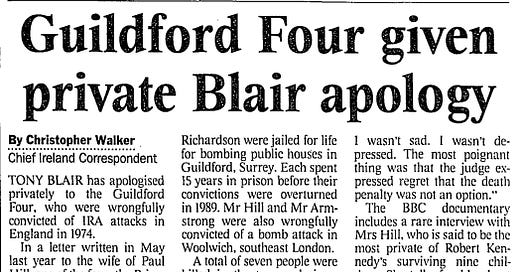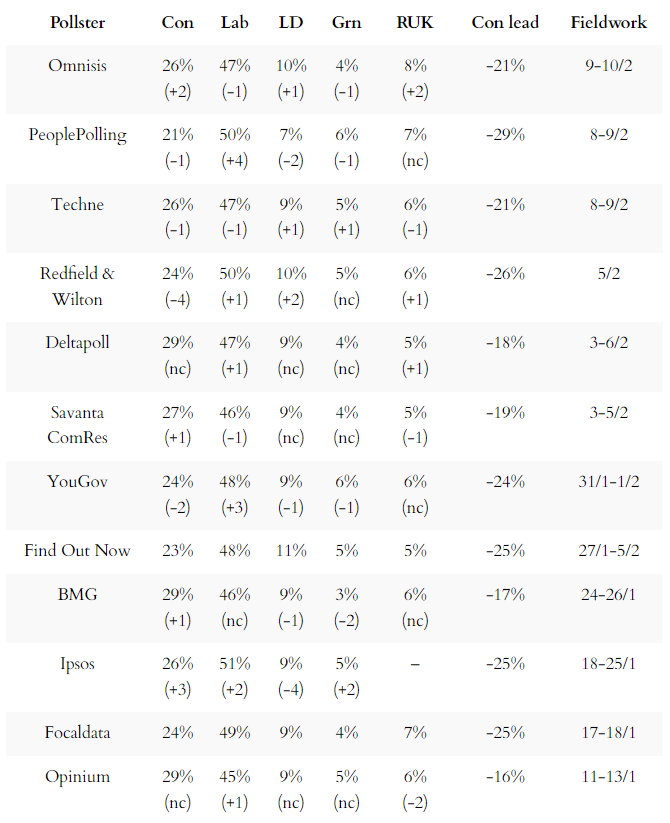Public opinion and the death penalty
Welcome to the burst of new subscribers to The Week in Polls who have signed up in the last week. Someone, somewhere seems to have particular liked what I wrote last time and spread the sign up link around. Thank you mystery benefactor!
This time I’m taking a deeper dive into the polling figures behind the death penalty as we’ve had a high profile politician calling for its re-introduction, claiming it’s what the public wants. But does it? Read on to find out.
As ever, if you have any feedback or questions prompted by what follows, or spotted some other recent polling you’d like to see covered, just hit reply. I personally read every response. Or if you’d like more news about the Lib Dems specifically, sign up for my monthly Liberal Democrat Newswire.
My privacy policy and related legal information is available here. Please note that if you are subscribed to other email lists of mine, unsubscribing from this list will not automatically remove you from the other lists. If you wish to be removed from all lists, simply hit reply and let me know.
Public opinion and the death penalty: more complicated than populists claim
Part of one of the many newspaper stories about the wrongful conviction of people for IRA terrorist offences.
The wrongful convictions of both the Guildford Four and the Birmingham Six for Irish terrorists offences were headline news for many years - the convictions, the controversies and then the eventual acquittals.
Shortly after one of the acquittals had been all over the news, the Daily Telegraph published polling from Gallup on the death penalty. Asked a general question about supporting the death penalty for certain crimes, the poll found public support. But that then dropped sharply when people were asked if they would support it even if it resulted in innocent people being killed.
Even at a time when wrongly convictions for terrorist murders were in the news, reminding people in a polling question that the death penalty might result in the innocent being executed moved the numbers significantly.
I’ve always remembered this as an example of how polling on political issues that have not already been subject to extensive public debate is best viewed as an indicator of what the contours of such a debate would look like, rather than as a confident prediction of its outcome. In this case, that instinctive support for the death penalty could well melt away when faced with practicalities such as the near certainty of innocent people dying at some point.
That point is applicable more generally on issues of crime and punishment too, as pollster Ben Page pointed out this week:

This comment came in reaction to discussion of the death penalty following Rishi Sunak’s decision to appoint as Deputy Chairman of the Conservative Party a vocal and enthusiastic supporter of it.
So, as this is a polling newsletter, what do the polls tell us about public attitudes to the death penalty?
A poll this week from Omnisis found 58% supporting the death penalty for some crimes. But in the same poll when asked if it is an effective deterrent, only 43% agreed and when asked if the death penalty has no place in a modern, civilized society, only 38% disagreed (though 31% also picked neither agree nor disagree). Having only minorities positively assent to it being a deterrent or having a place in a modern, civilized society suggests a lot of softness in that initial 58% finding.
That’s a picture reinforced by the YouGov trackers which show support for the death penalty for different crimes varying from 52% for multiple murders down to 30% for all murders. Even the former is only just over 50%, and Deltapoll earlier this year found support falling too if the question is framed as a choice between death or a mandatory life sentence where life means staying in jail forever. Support for the death penalty with this wording varied for different crimes from 14% up to 46%, but none topped 50%:


So although attitudes towards the death penalty are highly polarised (with highest support among voters for Reform or the Conservatives), support for it is also rather soft. What we don’t know is how soft the opposition to the death penalty is, because polling tends to test additional reasons to oppose it rather than, for example, testing out adding in to polling questions emotive arguments in favour of it or how long those sentenced to ‘life’ tend to serve in practice.
Even so, it’s clear there isn’t strong, deeply rooted support for the death penalty from a majority of the public. The support there is often falls short of the 50% barrier and even when it goes beyond it, it’s vulnerable to arguments over the practical impact of the policy.
For more on how question wording can shift the results on questions related justice and civil rights, see the final section below for polling on the European Court of Human Rights.
National voting intention polls
Here’s the latest from each currently active pollster:
Perhaps the worst news for the Conservatives in all those polls is that a Labour lead above 20% has becoming boring, unexceptionable news.
For more details and updates through the week, see my daily updated table here.
Last week’s edition
Lessons from polls of the 1987 general election.
Know other people interested in political polling?
Reasons to beware dramatic seat projections, and other insights from this week’s polling…
Keep reading with a 7-day free trial
Subscribe to The Week in Polls to keep reading this post and get 7 days of free access to the full post archives.





